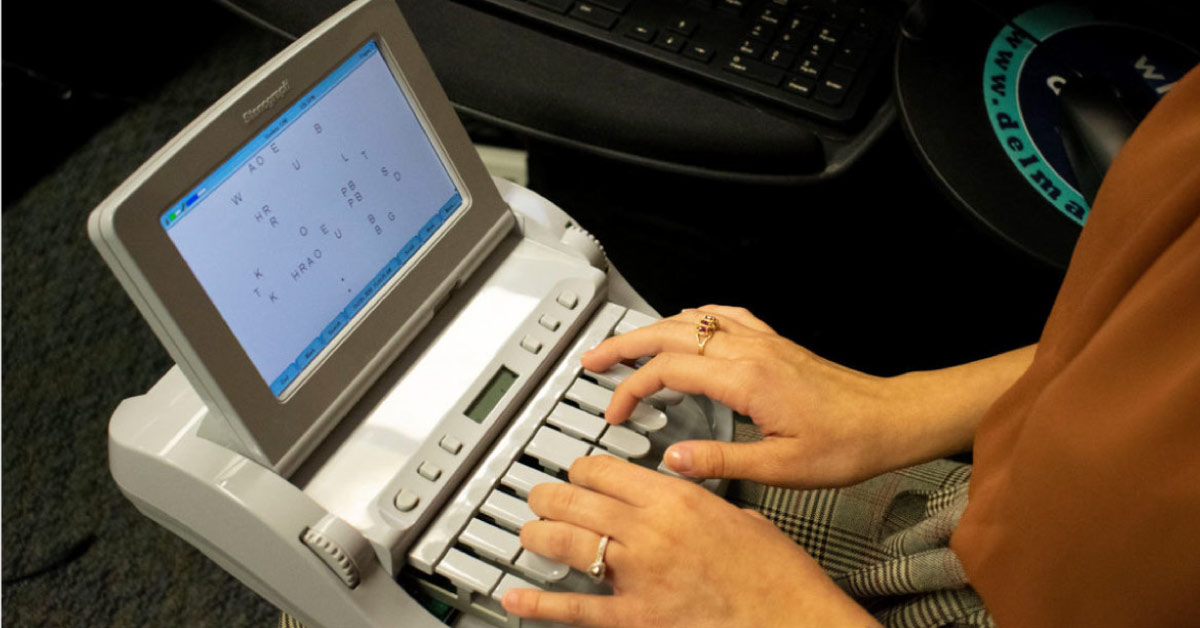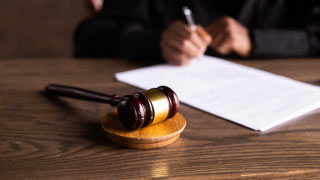The Deposition Process Explained
June 6, 2025
Court Reporting
The Deposition Process Explained: A Legal Team’s Guide
Depositions are a central part of the litigation process. They give attorneys a chance to question witnesses under oath, preserve testimony, and build the factual foundation of a case. But managing a deposition—from scheduling to transcript review—requires careful coordination across people, procedures, and technology.
This guide outlines what legal teams should know to run depositions efficiently and effectively. Whether you're preparing a witness, selecting a court reporting partner, or reviewing transcripts post-depo, each step can impact the strength of your case.
Once the logistics are set, shift your focus to content and people. Attorneys should outline the topics they want to cover and ensure exhibits are ready to go. Witnesses may need coaching on how to remain composed, avoid speculation, and request clarification when necessary.
Some legal teams now utilize AI tools for lawyers to enable them to review prior testimony, identify themes, or generate draft outlines. These tools can help save time and reduce cognitive load before the questioning begins.
During questioning, attorneys have wide latitude. The witness must answer unless the question is clearly improper or invokes privilege, in which case their attorney may object. Most objections are made on the record, but do not stop the deposition unless absolutely necessary. At the end, the attorneys may confirm logistics for transcript delivery, exhibits, or follow-up questions.
Because full transcripts are often lengthy, many teams create a deposition summary to highlight key portions. Summaries make it easier to pull quotes, identify contradictions, and brief co-counsel or clients without flipping through hundreds of pages. The post-depo phase is where the record becomes strategy.
Lexitas offers nationwide coverage, access to both in-person and remote deposition support, and seamless integration with post-deposition tools like deposition summary services.
When your team works with Lexitas, you gain:
Lexitas helps legal professionals manage every step of the deposition process—from logistics to transcript delivery to post-depo insights. Whether you’re navigating a complex case or working across jurisdictions, our team brings the experience and tools to keep things moving smoothly.
Need support for your next deposition? Let’s talk. We’re ready when you are.
This guide outlines what legal teams should know to run depositions efficiently and effectively. Whether you're preparing a witness, selecting a court reporting partner, or reviewing transcripts post-depo, each step can impact the strength of your case.
What Is the Purpose of a Deposition?
Depositions are more than a formality. They serve distinct purposes that shape litigation strategy and case outcomes. At a high level, legal teams rely on depositions to:- Gather Sworn Testimony: Attorneys use depositions to collect detailed, on-the-record statements from witnesses or parties. This helps clarify facts, fill in gaps, and explore issues before trial.
- Preserve Testimony: Depositions lock in what a witness said, which is critical if that person later becomes unavailable or contradicts themselves during trial.
- Support Case Analysis and Negotiation: Testimony from depositions informs legal strategy, helps draft motions, and often drives settlement discussions.
Who’s Involved in the Deposition Process
Every deposition includes a core group of participants. Depending on the case and format, you may also coordinate with professionals who join virtually or provide support services. Whether the setting is in-person or a remote deposition, knowing who is involved and what they do ensures smoother preparation and execution.Common Deposition Participants:
- Deponent (Witness): The individual being questioned under oath. This may be a party to the case or a third-party witness.
- Deponent’s Attorney: Advises and protects the witness during questioning, and may object to improper or confusing questions.
- Opposing Counsel: The attorney conducting the examination and controlling the flow of questions.
- Court Reporter: Captures the official record, administers the oath, and later produces the certified transcript.
- Videographer: Optional, but often used to capture demeanor and tone in addition to the written record.
- Interpreter: Present when needed to ensure accurate communication across languages.
How to Schedule and Prepare for a Deposition
Solid preparation makes for a smoother deposition. Start by confirming the basics: date, time, location, and video conference platform. If you're working with a court reporting provider, make sure they know whether this will involve real-time access, video capture, or multiple parties logging in remotely. Getting those details right from the start prevents surprises.Once the logistics are set, shift your focus to content and people. Attorneys should outline the topics they want to cover and ensure exhibits are ready to go. Witnesses may need coaching on how to remain composed, avoid speculation, and request clarification when necessary.
Some legal teams now utilize AI tools for lawyers to enable them to review prior testimony, identify themes, or generate draft outlines. These tools can help save time and reduce cognitive load before the questioning begins.
What Happens During the Deposition
Depositions begin with the court reporter swearing in the witness and recording their identifying information. Once that’s complete, the questioning starts. Typically, the attorney who scheduled the deposition begins, followed by any cross-examination or redirect from opposing counsel. If the deposition is being recorded, the videographer may make announcements to note transitions.During questioning, attorneys have wide latitude. The witness must answer unless the question is clearly improper or invokes privilege, in which case their attorney may object. Most objections are made on the record, but do not stop the deposition unless absolutely necessary. At the end, the attorneys may confirm logistics for transcript delivery, exhibits, or follow-up questions.
What Happens After a Deposition
Once the deposition ends, the court reporter finalizes and certifies the transcript. Legal teams typically receive a draft to review for accuracy before the final version is shared with all parties. Depending on case needs, this transcript can be used to draft motions, challenge testimony, or support summary judgment efforts.Because full transcripts are often lengthy, many teams create a deposition summary to highlight key portions. Summaries make it easier to pull quotes, identify contradictions, and brief co-counsel or clients without flipping through hundreds of pages. The post-depo phase is where the record becomes strategy.
Common Questions from Clients and Witnesses
Even experienced legal teams often field the same questions from clients and witnesses ahead of a deposition. Here are some of the most common, with quick answers to help you prepare them effectively.Do I have to attend?
- Yes, unless excused by the court or legal counsel.
- Ignoring a deposition notice can lead to sanctions or other penalties.
What should I wear?
- Business casual is typically appropriate.
- Avoid logos, loud prints, hats, or anything distracting.
- Dress the same for a remote deposition as you would in person.
What should I bring?
- A valid photo ID (driver’s license or passport).
- Only bring documents approved by your attorney.
- Any material you refer to may be subject to review by opposing counsel.
How long will it last?
- Most depositions last a few hours but may go up to seven hours under federal rules.
- Breaks are allowed, but the clock continues to run unless otherwise agreed.
Why Court Reporting Support Matters
Accurate transcripts begin with the right court reporting partner. At Lexitas, court reporters don’t just show up to take notes—they’re trained professionals who understand legal nuance, follow strict procedural standards, and deliver certified transcripts with speed and precision. Every deposition benefits from a reliable reporter who can manage realtime output, remote environments, and complex scheduling.Lexitas offers nationwide coverage, access to both in-person and remote deposition support, and seamless integration with post-deposition tools like deposition summary services.
When your team works with Lexitas, you gain:
- Court reporters with specialized experience across jurisdictions and case types
- Built-in scheduling support and technology compatibility
- Consistent, high-quality transcript delivery with secure access
Final Takeaway: Use Depositions Strategically
Depositions are more than a discovery requirement. Done well, they help legal teams clarify facts, preserve testimony, and shape stronger litigation strategies. But getting the most out of them takes coordination, clarity, and reliable support.Lexitas helps legal professionals manage every step of the deposition process—from logistics to transcript delivery to post-depo insights. Whether you’re navigating a complex case or working across jurisdictions, our team brings the experience and tools to keep things moving smoothly.
Need support for your next deposition? Let’s talk. We’re ready when you are.
Related Resources

Articles
Court Reporting
How to Find a Court Reporter: Choosing the Right Provider
Find a court reporter with the right provider—ensure accuracy, security, and efficiency with expert services, real-time transcription, and remote depositions.
Read More
Articles
Court Reporting
What You Should Expect from Your Court Reporting Firm
Here are five things to expect from your court reporting firm to have your case go smoothly.
Read More
Articles
Court Reporting
Leverage Your Team While Taking a Deposition
Here are five ways you can leverage your office team while taking a deposition.
Read More